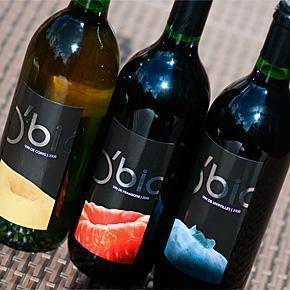
Time for a tasting – O’Bio Belgian Fruit Wines
Although we are ardent fans of the grape, good wine can be made from virtually any fruit. One organic orchard in Belgium is doing just that, with their collection of Belgian fruit wines. Recently, we tasted three of the O’Bio fruit wine range, from Bezegaard orchard, near Ghent.
While Andrew works his way through Belgian beer, in his Belgium in a Glass series, I have dedicated myself to Belgium’s lesser-known beverages. Last time, we talked about my favourite Belgian Bubbles – Cuvée Seigneur Ruffus. Today we’re looking at the sweeter side of Belgian winemaking.
I must confess my dedication to the grape, particularly in its fermented form, so I was slightly biased against wines made from other fruits. However, I had heard Belgium produces some great fruit wines, so I decided to see what all the fuss was about. Luckily, I had some plucky volunteers (they prefer this title to ‘my lushy friends’) to help me on my quest.
My quest was further simplified when our organic delivery service, Reason2.be, began supplying a variety of organic wines. Listed in their offerings are a selection of O’Bio fruit wines. I had three bottles delivered to my door, rounded up my taste-testers and dove in.
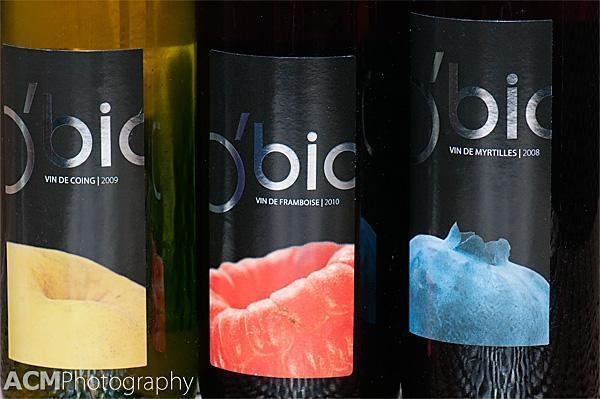
Delivered to my door – Here are our three contenders from O’Bio.
Our first Belgian fruit wine was O’Bio Vin de Coing, or quince wine. Quince is a fruit I didn’t know before moving to Belgium. For those of you unfamiliar with it, quince is in the same family as apples and pears and resembles a bright yellow pear.
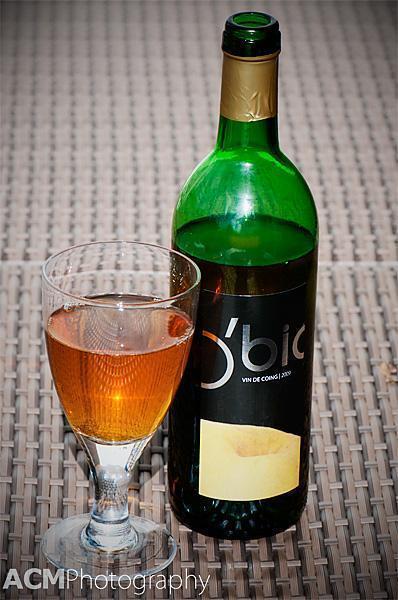
O’Bio Vin de Coing – Belgian Quince Wine
The wine is also golden yellow and it has quite a greasy feel in the mouth, like a dessert wine. In fact, we all agreed the Vin de Coing is sweet enough to be classed as such. It reminded me of a jurançon wine and I can imagine it as an aperitif with foie gras or a nice rich paté. It would also pair well with sharp cheeses or a rich dessert.
Out of our group of four, the two men, who are both fans of sweet wine, enjoyed it. We ladies agreed it was nice in small doses, but we normally prefer dry wines.
Our second bottle was O’Bio Vin de Myrtilles, or blueberry wine. I come from blueberry country in Eastern Canada and have had my share of blueberry wine. I have to say, the Belgian blueberry wine stacked up nicely.
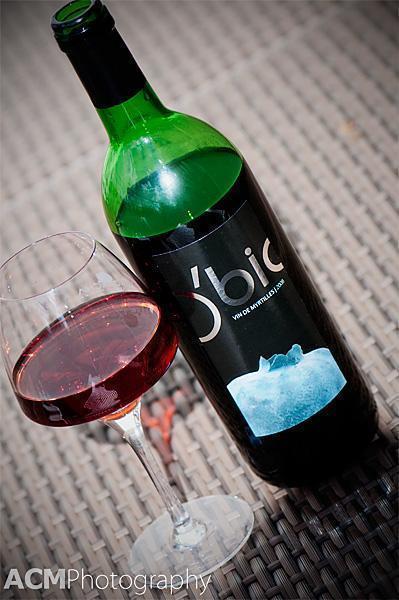
O’Bio Vin de Myrtilles – Belgian Blueberry Wine
Vin de Myrtilles is a deep red colour and although it is rich, it’s not as sweet and greasy as the Vin de Coing. There is a strong flavour of cinnamon and my fellow female taster remarked it reminded her of mulled wine and Christmas. Indeed, it does and would be lovely mulled.
I would pair this wine with rich game meat, hearty country-style paté or rillettes. Of the three wines, Vin de Myrtilles was the ladies’ choice.
Our final bottle sadly left us on a negative note, even though it was the one I was most looking forward too – O’Bio Vin de Framboise, raspberry wine. I love raspberries. In fact, framboise is the one concession I make to Belgian beer. But sadly, this wine didn’t win me over.
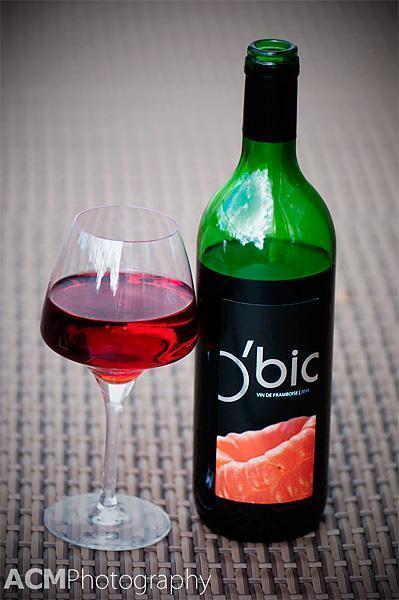
O’Bio Vin de Framboise – Belgian Raspberry Wine
The Vin de Framboise is bright red – soft-drink red, in fact. The bottle says to expect a sweet and sour flavour, but none of us could quite wrap our heads, or taste buds, around it. Although none of us liked the Vin de Framboise on its own, we all agreed, in the hands of a skilled mixologist, it could make the base for a great cocktail.
In addition to the three fruit wines we tried, O’Bio also offers: Vin de Groseilles (White currant), Vin de Cassis (Blackcurrant), Vin de Cérises (Cherry), Vin d’ Argousier (seabuckthorn), Vin de Sureau (Elderberry) and Vin de Canneberge (Cranberry; not available from Reason2.be at the time of writing). All of the fruit wines are 12% alcohol and cost €9.38 from Reason2.be.
Would I drink these wines every day? No, I won’t be giving up my grapes just yet, however I do think they are a unique and interesting way to shake up your wine routine. I’m looking forward to trying the other fruit wines in the O’Bio range and continuing my exploration of Belgium’s unknown beverages.
Bezegaard O’Bio
Driekoningenstraat 36a
8710 Wielsbeke – Belgium
- The Ultimate List of Castle Hotels in Belgium - June 10, 2019
- The Ultimate Guide to the Best Things to Do in Normandy, France - February 5, 2019
- The Ultimate Guide to the Best Restaurants in Brussels, Belgium - January 11, 2019
- Tasting Organic Cognac at Brard-Blanchard, in Poitou-Charentes
- Review: Belgin – Artisanal, Belgian Gin and Liqueurs
- Belgian Bubbles – Domaine des Agaises Cuvée Seigneur Ruffus
- Belgian Fruit Wine – O’Bio by Bezegaard Organic Orchard
- Cosmik – Belgian Fruit Vodka from Wallonia
- Poppies Gin – An English Style Mystery in Belgium
